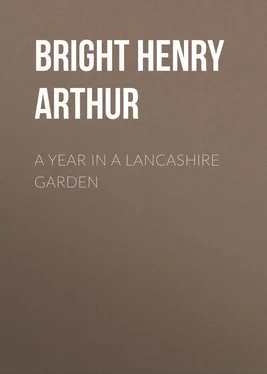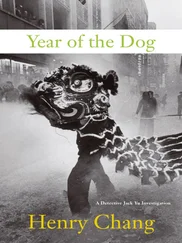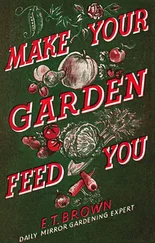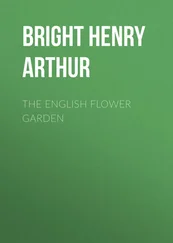Henry Bright - A Year in a Lancashire Garden
Здесь есть возможность читать онлайн «Henry Bright - A Year in a Lancashire Garden» — ознакомительный отрывок электронной книги совершенно бесплатно, а после прочтения отрывка купить полную версию. В некоторых случаях можно слушать аудио, скачать через торрент в формате fb2 и присутствует краткое содержание. Жанр: foreign_prose, foreign_antique, foreign_language, на английском языке. Описание произведения, (предисловие) а так же отзывы посетителей доступны на портале библиотеки ЛибКат.
- Название:A Year in a Lancashire Garden
- Автор:
- Жанр:
- Год:неизвестен
- ISBN:нет данных
- Рейтинг книги:4 / 5. Голосов: 1
-
Избранное:Добавить в избранное
- Отзывы:
-
Ваша оценка:
- 80
- 1
- 2
- 3
- 4
- 5
A Year in a Lancashire Garden: краткое содержание, описание и аннотация
Предлагаем к чтению аннотацию, описание, краткое содержание или предисловие (зависит от того, что написал сам автор книги «A Year in a Lancashire Garden»). Если вы не нашли необходимую информацию о книге — напишите в комментариях, мы постараемся отыскать её.
A Year in a Lancashire Garden — читать онлайн ознакомительный отрывок
Ниже представлен текст книги, разбитый по страницам. Система сохранения места последней прочитанной страницы, позволяет с удобством читать онлайн бесплатно книгу «A Year in a Lancashire Garden», без необходимости каждый раз заново искать на чём Вы остановились. Поставьте закладку, и сможете в любой момент перейти на страницу, на которой закончили чтение.
Интервал:
Закладка:
We are now bringing on our Strawberries; the Duc de Malakoff and Sir Charles Napier are the two we are forcing this year. Last year we had Oscar as well, but we found it a bad hanger, the first fruit damping away if it were not at once gathered. We are forcing also French Beans, Fulmer's Forcing, – and Tomatos, the Orangefield Dwarf. The prettiest thing in our vinery is a large Orange-tree, laden with last year's fruit, and soon to be covered with this spring's flowers. The fruit itself is only good for preserving, but it is wonderfully handsome, and no Orange-tree could be more prolific. Surely the old plan of having a separate Orangery is dying out in England, except of course in the very stately places. Thirty or forty years ago I think these Orangeries were more common in gardens of less pretension. I recall one, half green-house, half summer-house, with its large sashed windows opening to a lawn – windows round which a dozen creepers twined and blossomed; – inside stood the great Orange-trees in their huge tubs, waiting till the full summer, when they would be arranged along the broad terrace walk – in themselves beautiful, and calling up a thousand fragrant memories of Southern France and Italy. Now, I generally see trimmed Bays or Laurels arranged in porcelain pots, looking at once shabby and artificial. Of course I do not suppose Oranges worth growing except (a rather large exception) for their beauty; with Lemons it is different – they are certainly worth growing, – but then they do best trained up against the back of a moderately heated house, and not moved out in summer.
February 22. – Since I wrote we have had the sharpest and keenest frost – sharper than we have had all the winter; and an east wind which at once dried and froze up everything. Now spring has come again, and (as Horace says) has "shivered" through the trees. The Elders are already unfolding their leaves, and a Lonicera is in freshest bud. I remember when, a few years ago, Mr. Longfellow, the American poet, was in England, he told me that he was often reminded by the tender foliage of an English spring of that well-known line of Watts, where the fields of Paradise
"Stand dressed in living green ;"
and I thought of this to-day when I looked, as I remember he was looking, at the fresh verdure of this very Lonicera.
But all things are now telling of spring. We have finished our pruning of the wall-fruit; we have collected our pea-sticks, and sown our earliest Peas. We have planted our Ranunculus bed and gone through the herbaceous borders, dividing and clearing away where the growth was too thick, and sending off hamperfuls of Pæony, Iris, Œnothera, Snowflake, Japanese Anemone, Day Lily, and many others. On the other hand we have been looking over old volumes of Curtis's Botanical Magazine , and have been trying to get, not always successfully, a number of old forgotten plants of beauty, and now of rarity. We have found enough, however, to add a fresh charm to our borders for June, July, and August.
On the lawn we have some Aconites in flower. They are planted at the foot of two great Beech trees, and last year they lay there – a soft yellow light upon the grass. This year they are doing badly. I suspect they must have been mown away last spring before their tubers were thoroughly ripe, and they are punishing us now by flowering only here and there. I know no flower so quaint as this – the little yellow head emerging from its deeply-cut Elizabethan ruff of green. Then, too, the Crocuses are bursting up from the soil, like Byron's Assyrian cohorts, "all gleaming in purple and gold." Nothing is more stupid than the ordinary way of planting Crocuses – in a narrow line or border. Of course you get a line of colour, but that is all, and, for all the good it does, you might as well have a line of coloured pottery or variegated gravel. They should be grown in thick masses, and in a place where the sun can shine upon them, and then they open out into wonderful depths of beauty. I am afraid Dr. Forbes Watson's most charming book on Flowers and Gardens is too little known. No modern author, not even excepting Ruskin, has studied the form and the beauty of flowers so closely and lovingly as he has done, and he entirely bears out my view. He says —
"This is one of the many plants which are spoilt by too much meddling. If the gardener too frequently separates the offsets the individual blooms may possibly be finer, but the lover of flowers will miss the most striking charms of the humbler and more neglected plant. The reason is this: the bloom, when first opening, is of a deeper orange than afterwards, and this depth of hue is seemingly increased where the blossoms are small from crowded growth. In these little clusters, therefore, where the flowers are of various sizes, the colour gains in varieties and depth, as well as in extent of surface, and vividness of colour is the most important point in the expression of the yellow Crocus."
Besides the clusters along the shrubberies and the mixed borders, I have a number on the lawn beneath a large weeping Ash; the grass was bare there, and, though this is hidden in summer by the heavy curtains of pendent boughs and crowding leaves, it was well to do something to veil its desolation in the spring. Nothing can be more successful than a mass of Crocus, yellow, white, and purple.
I sometimes think that the Crocus is less cared for than it deserves. Our modern poets rarely mention it; but in Homer, when he would make a carpet for the gods, it is of Lotus, Hyacinth, and Crocus; and Virgil's bees find their honey among Cassia and Lime blossoms, and "iron-grey Hyacinths and glowing Crocus." Virgil speaks, too, of the scent of the Crocus (whatever that may be), and all Latin authors, when they wish to express a bright deep orange colour, call it the colour of the Crocus.
Our cool vinery is now gay with stages of Narcissus, Tulips, and Hyacinths, which have been brought on in heat, and are well rewarding us for what care we have given to them.
IV
The Rookery – Daffodils – Peach Blossoms – Spring Flowers – Primroses – Violets – The Shrubs of Spring.
March 6. – We have a tradition, or, if you will, a superstition, in this part of the world, that rooks always begin to build on the first Sunday in March. Last year my rooks were punctual to a day. This year, although they began a day or two earlier, it was not till the morning of Sunday the 1st that they showed real activity. Then the belt of trees which they frequent, and which for want of any better name we call "our wood," was all alive and clamorous. These rooks are only with us from March to the end of May, and then they are off again for the rest of the year to the woods which cluster thickly round the stately hall of the great nobleman of our county. But they never quite forget their nests among our Elms; and it is pleasant to see them in summer, and oftener still in late autumn, winging their way across the fields, and then wheeling down upon the trees. Who was it, who so happily applied to rooks the lines from the sixth Æneid, where Virgil, speaking of the descent of Æneas and his guide upon the Elysian plains, says
"Devenere locos lætos, et amœna vireta
Fortunatorum nemorum, sedesque beatas"?
"And down they came upon the happy haunts,
The pleasant greenery of the favoured groves —
Their blissful resting-place."
There are many secrets about the rooks which I can never solve. Why do they build in the Elm rather than the Beech? My best trees are Beeches, but there are only two nests in them, whereas in a single Elm there are no less than ten. Why, again, do the old birds prevent the young ones from building in some particular tree? Sometimes, no doubt, there may be an unhappy association of the past, as in a case mentioned in Hawthorne's English Note Book , where in a garden, which I took him to see, not very far from this, some nests were once destroyed in a clump of trees, and never since has nest been built there. Sometimes, I think, because the rooks like to reserve certain trees as storehouses, from whence to gather their sticks. Again, how far is rook-shooting good for a rookery? It is commonly believed that, if a certain number are not shot, the rooks will desert. Is this so, and, if so, what should be the proportion? I have some sixty nests, and I wish to keep about this number.
Читать дальшеИнтервал:
Закладка:
Похожие книги на «A Year in a Lancashire Garden»
Представляем Вашему вниманию похожие книги на «A Year in a Lancashire Garden» списком для выбора. Мы отобрали схожую по названию и смыслу литературу в надежде предоставить читателям больше вариантов отыскать новые, интересные, ещё непрочитанные произведения.
Обсуждение, отзывы о книге «A Year in a Lancashire Garden» и просто собственные мнения читателей. Оставьте ваши комментарии, напишите, что Вы думаете о произведении, его смысле или главных героях. Укажите что конкретно понравилось, а что нет, и почему Вы так считаете.












